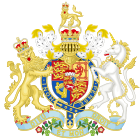Slave Trade Felony Act 1811
Appearance
 | |
| Long title | An Act for the Abolition of the Slave Trade |
|---|---|
| Citation | 51 Geo III c. 23 |
| Introduced by | Henry Brougham |
| Territorial extent | British Empire |
| Dates | |
| Royal assent | May 1811 |
The Slave Trade Felony Act 1811 (51 Geo. III, c. 23) was a piece of British legislation which made engagement in the slave trade a felony. The earlier Slave Trade Act 1807 merely imposed fines which were insufficient to deter entrepreneurs from engaging in such a profitable business. The contexts in which it could be applied and how these sat within international criminal law gave rise to controversy.[1]
The first case brought under the act was that of Samuel Samo, who was tried by Chief Justice Robert Thorpe at the Vice-Admiralty Court in Freetown, Sierra Leone. The case was heard from 8-11 April 1812.
See also
References
- ^ Haslam, Emily (2012). "Redemption, Colonialism and International Criminal Law". In Kirkby, Diane (ed.). Past law, present histories. Canberra, Acton, A.C.T.: ANU E Press. ISBN 9781922144034.
{{cite book}}:|access-date=requires|url=(help)
